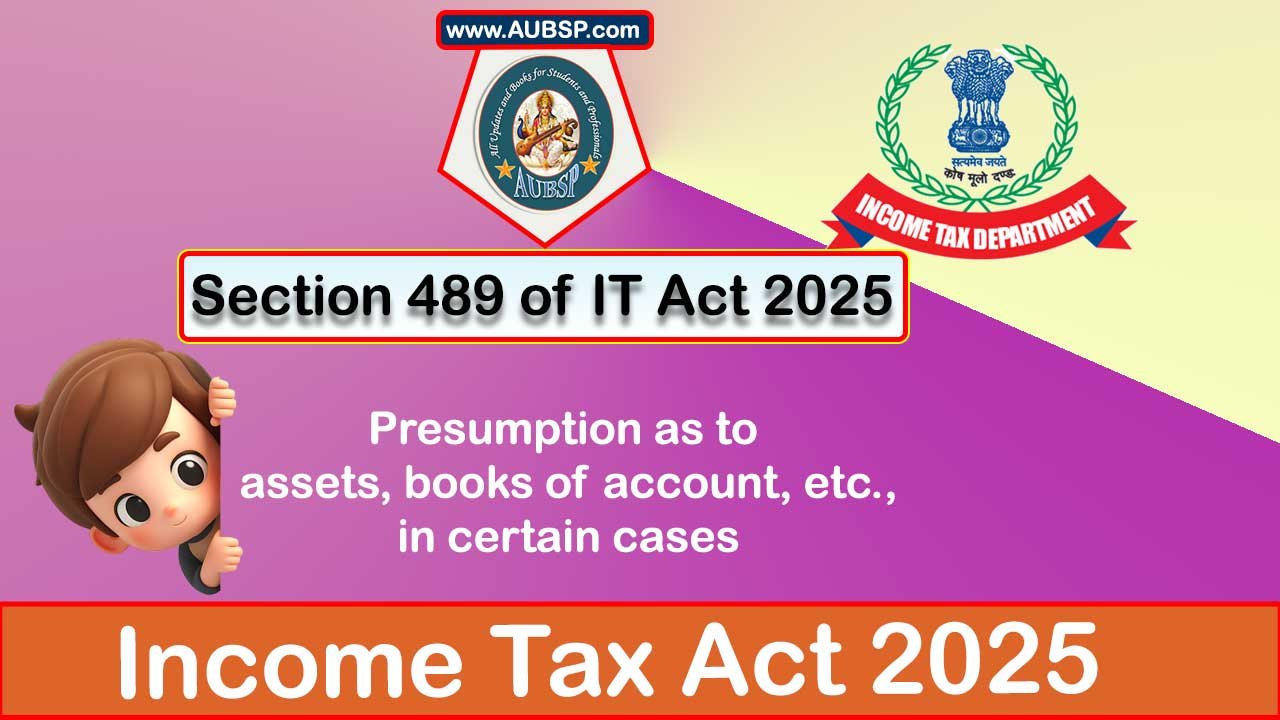Presumption as to assets, books of account, etc., in certain cases
[Section-489 as per the Income Tax Act, 2025 (this Act) w.e.f. 1st April, 2026.]
Section 489(1) of Income Tax Act 2025
489(1) Where during the course of any search made under section 247, any money, bullion, jewellery, virtual digit asset or other valuable article or thing (herein referred to as the assets) or any books of account or other documents, has or have been found in the possession or control of any person and such assets or books of account or other documents are tendered by the prosecution in evidence against such person, or against such person and the person referred to in section 484, for an offence under this Act, the provisions of section 247(7) shall, so far as may be, apply in relation to such assets or books of account or other documents.
Section 489(2) of Income Tax Act 2025
489(2) Where any assets or books of account or other documents taken into custody from the possession or control of any person, by the officer or authority referred to in section 248(1)(a) or (b) or (c) are delivered to the requisitioning officer under sub-section (2) of that section and such assets, books of account or other documents are tendered by the prosecution in evidence against such person, or against such person and the person referred to in section 484, for an offence under this Act, the provisions of section 247(7) shall, so far as may be, apply in relation to such assets or books of account or other documents.
FAQs on Section 489 of Income Tax Act 2025
What is the main purpose of Section 489(1) of the Income Tax Act, 2025?
Section 489(1) allows the presumption of ownership and link of assets or documents found during a search under Section 247 to a person, and permits their use as evidence against that person or another specified under Section 484 in proceedings for offences under this Act.
What kinds of items are covered under Section 489(1)?
It covers money, bullion, jewellery, virtual digital assets, or other valuable articles or things, as well as books of account and other documents.
When do the presumptions under Section 247(7) apply in the context of Section 489(1)?
They apply when the assets or documents found during the search are produced by the prosecution as evidence in a case under this Act.
Does Section 489(1) apply only to the person in whose possession the assets were found?
No, it applies both to the person from whom the assets or documents were found and to any other person referred to under Section 484, if they are jointly prosecuted.
What does Section 489(2) address?
Section 489(2) deals with situations where assets or documents are taken into custody by officers or authorities under Section 248(1)(a), (b), or (c), and later handed over to the requisitioning officer.
What happens when such assets or books are tendered as evidence by the prosecution under Section 489(2)?
In such cases, the provisions of Section 247(7) also apply, meaning the assets or documents are presumed to belong to the person from whom they were taken, unless proven otherwise.
Who are the officers or authorities mentioned in Section 248(1)(a), (b), or (c)?
These refer to specific officers or authorities empowered to conduct requisitions and seizures under Section 248, such as Income Tax authorities, enforcement officers, or other designated officials under this Act.
What is the significance of linking Section 489 to Section 247(7)?
It ensures consistency in legal presumptions regarding possession and ownership of assets or documents found during searches or requisitions, making them admissible as evidence unless rebutted.
Can the presumption under Section 489 be rebutted by the accused?
Yes, the person against whom the presumption is made can present evidence to rebut or disprove the ownership or relevance of the assets or documents.
Does Section 489 cover virtual digital assets explicitly?
Yes, it includes virtual digital assets along with traditional forms of wealth like money, bullion, and jewellery.


